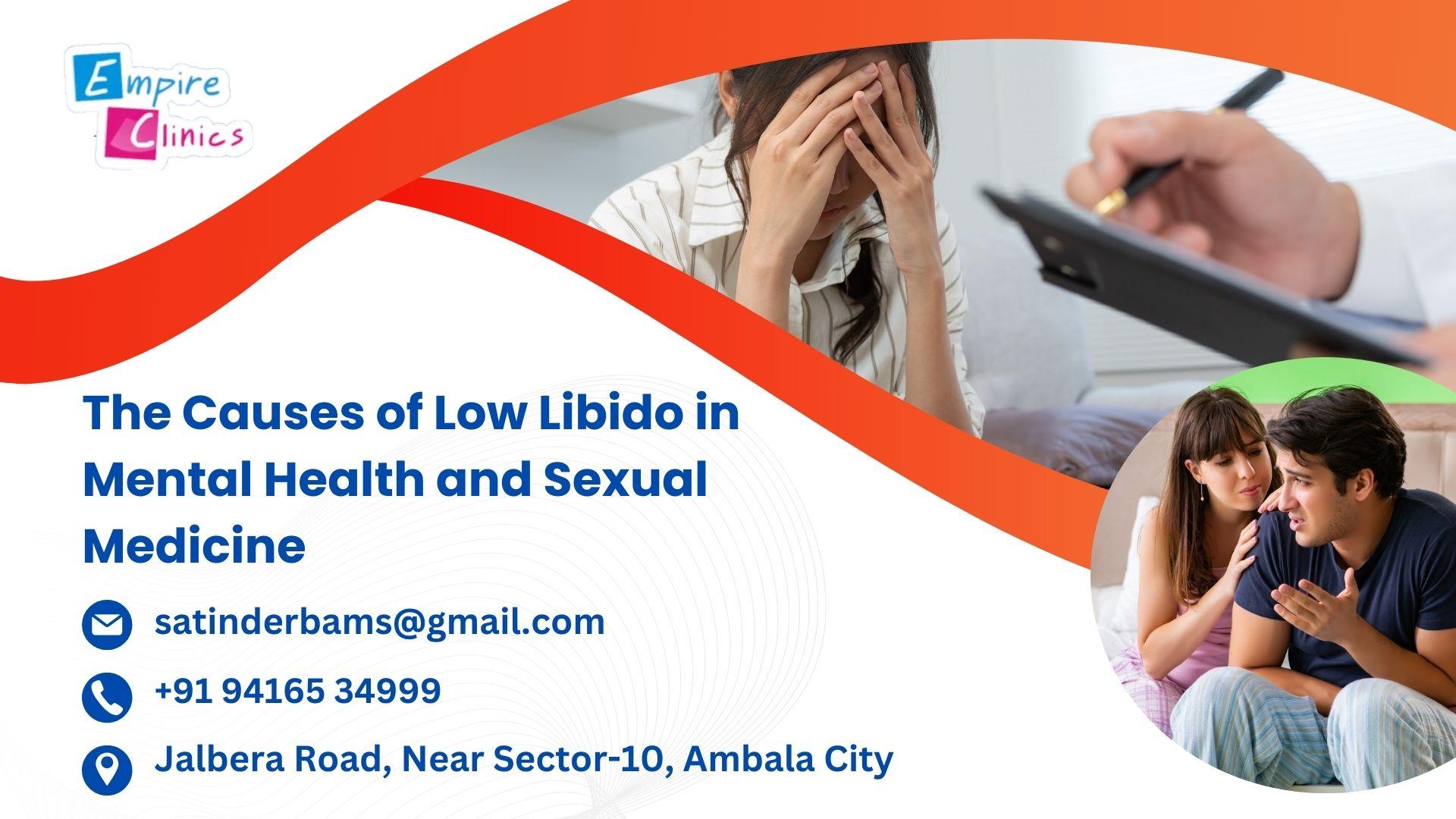Sexual health is a vital component of overall well-being, encompassing physical, emotional, and relational aspects of life. One common issue that many individuals face is low libido, or a decreased interest in sexual activity. This can stem from a variety of factors, including mental health conditions, medical issues, lifestyle choices, and relationship dynamics.
Table of Contents
Mental Health and Sexual Medicine: Addressing Low Libido
Low libido, or reduced sexual desire, can significantly impact an individual's quality of life and relationships. Understanding the interplay between mental health and sexual medicine is crucial for addressing this issue effectively. Here, we delve deeper into how mental health conditions and treatments can influence libido and explore strategies for managing these challenges.
Mental Health Factors Affecting Libido
1. Stress and Anxiety
- Impact: Chronic stress and anxiety can lead to elevated cortisol levels, which interfere with sexual arousal and desire. These conditions can also cause fatigue and distract from sexual thoughts and activities.
- Management: Stress reduction techniques such as mindfulness, meditation, yoga, and regular physical activity can help. Cognitive-behavioral therapy (CBT) is particularly effective for managing anxiety and reducing its impact on sexual health.
2. Depression
- Impact: Depression can severely diminish libido through symptoms like fatigue, low energy, and a lack of interest in previously enjoyable activities, including sex. Antidepressants, particularly selective serotonin reuptake inhibitors (SSRIs), often have sexual side effects.
- Management: Treating depression with a combination of therapy and medication can improve overall well-being and sexual desire. Discussing medication side effects with a healthcare provider may lead to adjustments or alternatives that have fewer sexual side effects.
3. Relationship Issues
- Impact: Emotional disconnect, unresolved conflicts, and poor communication within a relationship can lead to reduced sexual desire. Intimacy and emotional closeness are key components of a healthy libido.
- Management: Couples therapy or relationship counseling can improve communication, resolve conflicts, and rebuild intimacy. Engaging in activities that foster emotional closeness can also enhance sexual desire.
4. Body Image and Self-Esteem
- Impact: Negative body image and low self-esteem can lead to self-consciousness during sexual activity, reducing desire. Societal standards and personal insecurities often contribute to these feelings.
- Management: Therapy, such as CBT, can help improve body image and self-esteem. Self-care practices and activities that promote a positive self-image can boost confidence and sexual desire.
5. Sexual Trauma
- Impact: Past experiences of sexual trauma can significantly affect sexual desire and lead to conditions like post-traumatic stress disorder (PTSD), which can interfere with sexual intimacy and enjoyment.
- Management: Trauma-focused therapy, including EMDR (Eye Movement Desensitization and Reprocessing) and trauma-informed CBT, can help individuals process and heal from past trauma, improving sexual health and desire.
Medical Factors and Treatments
1. Medications
- Impact: Various medications, including those for depression, high blood pressure, and birth control, can affect libido by altering hormonal levels, blood flow, or neurotransmitter function.
- Management: Discussing medication side effects with a healthcare provider can lead to adjustments or alternatives. In some cases, a change in dosage or timing of medication can mitigate these effects.
2. Hormonal Imbalances
- Impact: Hormonal imbalances due to menopause, andropause, thyroid disorders, or medical treatments can significantly affect libido. Low levels of estrogen, progesterone, and testosterone are common culprits.
- Management: Hormone replacement therapy (HRT) or other medical treatments can help restore hormonal balance. Consulting with an endocrinologist or a specialist in hormone therapy can provide personalized treatment plans.
3. Chronic Illness
- Impact: Chronic conditions such as diabetes, heart disease, and arthritis can lead to physical discomfort, fatigue, and reduced interest in sex. The psychological impact of chronic illness can also affect libido.
- Management: Managing the underlying chronic condition through medication, lifestyle changes, and therapy can improve overall well-being and sexual desire. Pain management and physical therapy may also help reduce discomfort during sexual activity.
4. Substance Abuse
- Impact: Alcohol and recreational drugs can depress the central nervous system, leading to reduced libido and sexual dysfunction. Chronic use can cause long-term damage to sexual health.
- Management: Reducing or eliminating the use of alcohol and recreational drugs can improve libido. Seeking help from addiction specialists or support groups can provide necessary support for overcoming substance abuse.
5. Sleep Disorders
- Impact: Insufficient sleep affects hormonal balance and energy levels, leading to reduced libido. Sleep disorders like insomnia and sleep apnea can exacerbate these effects.
- Management: Improving sleep hygiene, such as maintaining a regular sleep schedule, creating a restful environment, and avoiding stimulants before bedtime, can enhance sleep quality. Medical treatment for sleep disorders, such as CPAP for sleep apnea, can also help.
Integrative Approaches
1. Healthy Lifestyle Choices
- Diet and Exercise: A balanced diet and regular physical activity can boost overall health and energy levels, positively influencing libido. Certain foods, such as those rich in zinc and antioxidants, can also support sexual health.
- Mindfulness and Relaxation: Practices like yoga, meditation, and deep breathing exercises can reduce stress and enhance body awareness, contributing to a healthier sex drive.
2. Therapeutic Interventions
- Sex Therapy: Working with a certified sex therapist can address specific sexual concerns and improve communication and intimacy between partners.
- Counseling and Support Groups: Individual or group therapy can provide support for managing mental health conditions and their impact on sexual health.
Have any questions contact us now
Low libido is a multifaceted issue influenced by both mental health and medical factors. Addressing it requires a comprehensive approach that considers physical health, psychological well-being, relationship dynamics, and lifestyle choices. Consulting with healthcare professionals, including mental health specialists and sexual medicine experts, can help identify underlying causes and develop effective treatment plans. Open communication with partners and adopting healthy lifestyle practices can also significantly improve sexual desire and overall well-being.







